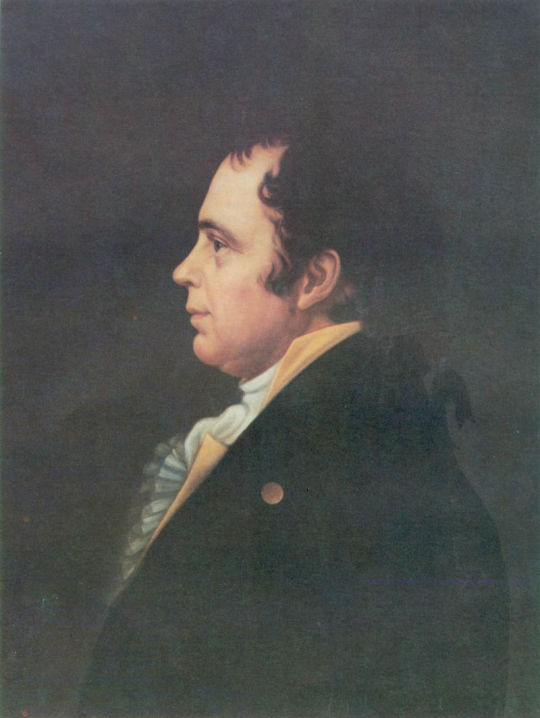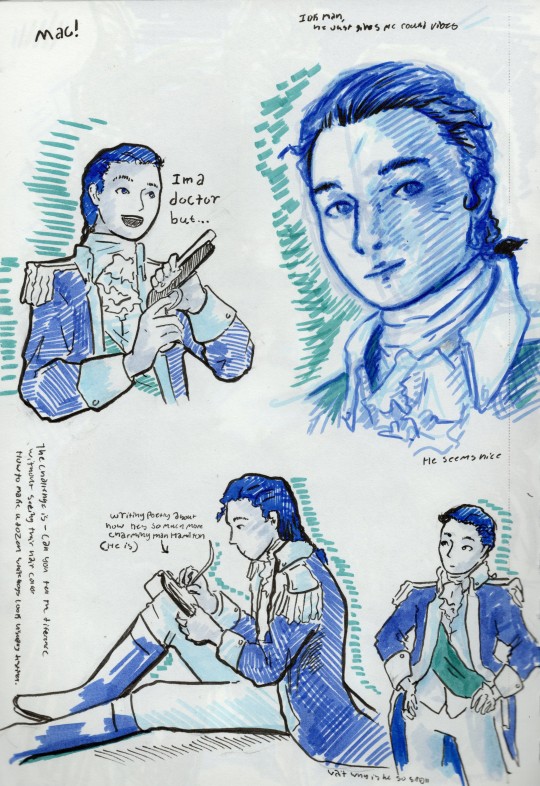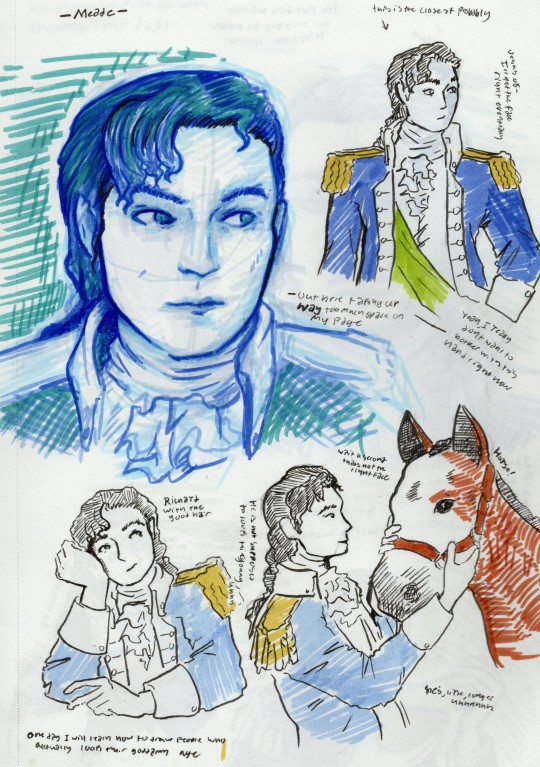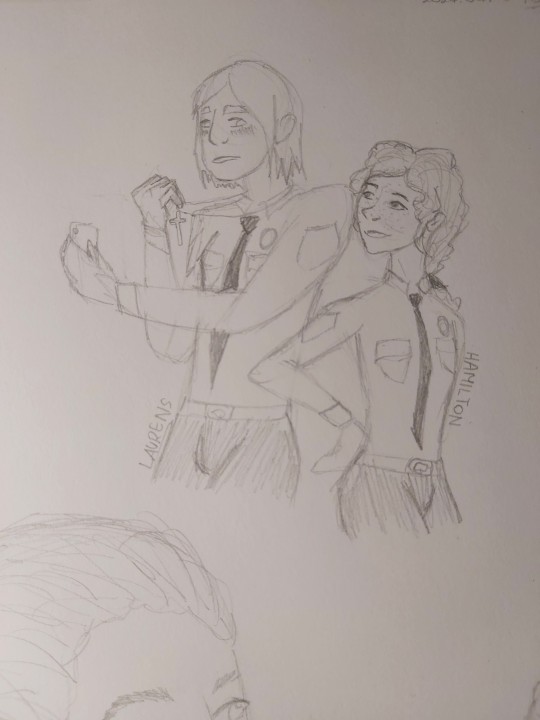#James Mchenry
Text

I'm sure he'll be fine
#king of saying vaguely concerning shit#we're tagging everyone left to right lets go#tench tilghman#Robert Hanson Harrison#richard kidder meade#marquis de lafayette#james mchenry#john laurens#alexander hamilton#amrev#washington's aides#art tag
214 notes
·
View notes
Text
#historical hamilton#amrev#Washington's aides#American Revolution#American Revolutionary War#Historical John Laurens#historical Alexander Hamilton#Historical Lafayette#John Laurens#Lafayette#Alexander Hamilton#John Fitzgerald#Joseph Reed#James Mchenry#George Washington#tench tilghman#richard kidder meade
71 notes
·
View notes
Text
So I might be watching too much Bones recently but what if we make up a police detective mystery with the Aide-de camps?
I sort of already have a vision. This is so far what I have:
For the protagonists we have Meade and Tilghman as a comedy duo
Washington is the head of the police station
McHenry is the forensic medicine expert
Hamilton is the bright youth of the team that everybody questions first if he is old enough for his position.
Laurens is the newish addition to the team (his role is depending on if we stay with irl timeline)
(Also yes, there is the secret office romance thing going on but if it's modern day, we can change the homophobia to no work realtionships allowed.)
Feel free to add more!
#amrev#american revolutionary war#amrev fandom#amrev au#alexander hamilton#john laurens#tench tilghman#richard kidder meade#james mchenry#george washington#lams#office comedy au#that is how I will call it#because they are silly#my sillies
16 notes
·
View notes
Text
The friendship of Achilles for his dear Patroclus, as celebrated by Homer, has survived the fate of empires and the charges of time, as if destined to serve as a perpetual monument sacred to friendship. May not another Homer arise to consign yours for Fayette to equal immortality, and tears of pleasure flow at its recital like an exhaustless stream through the long period of future ages.
McHenry to Washington on April 3, 1794 on Lafayette's imprisonment. A few lines before he had told Washington to be sensible, assumingly with what little they could do. (So take that Cabinet Battle #2 Washington cared for Lafayette to the point of being told he had to be sensible. But helping in France wouldn't have freed him)
I very much need to sit with this quote for a few days but also. If I'm getting this right McHenry is saying that if Lafayette died in his prison, Washington's grief would be akin to Achilles' to Patroclus and stories would be written about it, immortalizing their friendship for ages to come, as he says "May not another" so they don't want this friendship to be immortalized similarly to Achilles+Pat because it means it ended sadly. (I may be off about my initial interpretation)
It's... Very sad. Like I can't imagine how heartbreaking it it to write this and pray for your friend's sake your other friend lives cause it's shaping up for a grief that will shape generations. (It's giving Alexander and Hephaestion and Alexander clinging to Phai's dead body for days until the companions had to drag him away)
I think of Hamilton and Laurens as that generation's A+P because Laurens died so early and Hamilton retreated into himself and buried himself in work to ignore his grief but we very much could've gotten a world where they executed Lafayette and he and Washington's friendship was immortalized with Homerian grief. Heck, Adrienne was a day away from being executed the following year and she did nothing wrong but be married to Lafayette.
I just... comparing people to Achilles and Patroclus is really telling. Even ignoring the romance part(idk what the 18th century take on those two and romance was. I could see, if one of them had heard of it, the gay trio supporting it.)
#george washington#marquis de lafayette#lafayette#washette#Mchenry was a very good egg though#james mchenry#I may be way off in my interpretations btw#but it's so sad#it must've been so hard#waiting for years#for either good news or the worst news#and what do you do if the worst news comes#what do they do-the ones who love george#how do you hold achilles together when he falls to dust#after years of anxiety
11 notes
·
View notes
Text


I am happy to have it in my power to mention the merit of your friend Hammy [Hamilton]. He was incessant in his endeavours during the whole day—in reconnoitering the enemy, and in rallying and charging.—But whether he or Col. [John] Laurens deserves most of our commendation is somewhat doubtful—both had their horses shot under them, and both exhibited singular proofs of bravery. They seemed to court death under our doubtful circumstances, and triumphed over it as the face of war changed in our favor.—Independent of any prejudice I may have conceived for Colonel Laurens in consequence of his virtues, I cannot but speak of him in terms of the highest military deserving.—Colonel [John] Fitzgerald also, and Colonel [Richard Kidder] Meade claim the greatest encomiums—The former received a slight contusion. Even the Secretaries caught the general contagion, and had the audacity to put themselves in places of danger, and to share some of the honors of the day.
I wish I could do justice to his Excellency [Washington]; but you will hear of his conduct and the singular talents which he unfolded with the effects they produced in the complexionary the combat from other hands.
Source — James McHenry to Elias Boudinot, [July 2, 1778]
James McHenry recalling the Battle of Monmouth, which was only a week prior to the letter.
#amrev#american history#american revolution#alexander hamilton#historical alexander hamilton#james mchenry#elias boudinot#historical john laurens#john laurens#john fritzgerald#richard kidder meade#george washington#washington's aides#letters#history#cicero's history lessons#battle of monmouth
69 notes
·
View notes
Text
“(Alexander) Hamilton is an intriguant -- the greatest intriguant in the World -- a man devoid of every moral principle -- a Bastard, and as much a foreigner as Gallatin [Albert Gallatin, a Founding Father born in Switzerland]. Mr. Jefferson is an infinitely better man; a wiser one, I am sure, and, if President, will act wisely. I know it, and would rather be Vice President under him, or even Minister Resident at the Hague, than indebted to such a being as Hamilton for the Presidency.”
-- President John Adams to his Secretary of War James McHenry, during a tense meeting after the President forced McHenry and other Hamilton loyalists in his Cabinet to resign for allegedly scheming against him, May 5, 1800.
#History#John Adams#President Adams#Founding Fathers#Alexander Hamilton#Thomas Jefferson#1800 Election#Feuding Founders#James McHenry#Cabinet of John Adams#Presidency#Politics#Federalist Party#Albert Gallatin#Team Burr#I'm An Aaron Burr Guy
38 notes
·
View notes
Text
bro i literally just saved a picture of mchenry where did it go

found it
49 notes
·
View notes
Text
24 Days of La Fayette - December 24th: Doctor James McHenry
I hope that everybody who celebrates Christmas has a most happy and blessed day!
There were no posts these last few days because life simply got in the way. But they will follow in a few days. :-)

On this last day we focus on the most famous (and probably the most beloved by the modern audience) aide-de-camp of La Fayette – Doctor James McHenry. I purposely kept the part about his life before and after his tenure as aide-de-camp to La Fayette brief. Not because there is not enough information, quite the contrary – McHenry was very involved in the politics and social life of the young Republic, and one could fill volumes with his life and actions.
He was born on November 16, 1753 in Dublin and was educated there before emigrating to Philadelphia in 1771. After a short pause, he continued to study medicine under Doctor Benjamin Rush, one of the signers of the Declaration of Independence. He joined the war effort out of patriotism for his new home and worked at the American Continental Hospital in the fall of 1775 before being appointed surgeon for the 5th Pennsylvania Regiment on August 10, 1776. He was captured during the assault on Fort Washington on November 16 of the same year and spend his time treating fellow prisoners of war. McHenry was part of a prisoner exchange in March of 1778, and he returned to the army and served as a surgeon during the encampment in Valley Forge. In May of 1778 he accepted George Washington’s offer to become one of his assistant secretaries. Two years later, in 1780, McHenry was yearning for a change.
James McHenry wrote to George Washington on July 18, 1780:
I would beg leave to mention to your Excellency, a matter, in which I feel too much to be longer without laying it before you. The approaching campaign opening an interesting field, makes me desirous to appear, in a more military character, than that I now hold. I have also had before me for some time past, a prospect of visiting Europe; and especially those places where our interest is most cherished: And as my present character, of secretary, is not in the same estimation, there, as with us, I would therefore request your Excellency, that I may be considered as a volunteer. Hitherto, I have acted without pay, and it is my intention to receive none in future, unless some alteration in my circumstances render it necessary. If I receive your permission, to come as a volunteer, or accept such a station in the army as may place me, wholly, in a military light, I shall be happy, because, in it, I combine, with what I owe myself, that duty proper to my country.
“To George Washington from James McHenry, 18 July 1780,” Founders Online, National Archives, [Original source: The Papers of George Washington, Revolutionary War Series, vol. 27, 5 July–27 August 1780, ed. Benjamin L. Huggins. Charlottesville: University of Virginia Press, 2019, pp. 175–176.] (12/21/2022)
In alignment with McHenry’s remarks that he desired a more “hands-on” position in the army and desired to be employed in a military position, he transferred to La Fayette’s staff in August of 1780 and became the Marquis’s voluntary aide-de-camp. While an aide-de-camp was still a far cry from a field-command, the position was more military than the position of a secretary.
Alexander Hamilton wrote to James Duane on July 22, 1780:
I take the liberty my Dear Sir to request your interest for a friend of mine and a member of the family, Dr McHenry. He wishes to quit a Station which among foreigners is not viewed in a very reputable light and to get into one more military. He will go into the Marquis’s family as an aide. He has been in the army since the commencement of the War—first in the medical line, since the 15th of May 78, as a Secretary to the Commander in Chief. You know him to be a man of Sense and merit. A more intimate acquaintance with him makes me hold him as such in an eminent degree. He has now no military existence properly speaking—no rank. I believe he is not immoderate.
“From Alexander Hamilton to James Duane, [22 July 1780],” Founders Online, National Archives, [Original source: The Papers of Alexander Hamilton, vol. 2, 1779–1781, ed. Harold C. Syrett. New York: Columbia University Press, 1961, pp. 363–364.] (12/21/2022)
In his new position, McHenry was a direct witness to one if not the greatest scandal during the American Revolution – McHenry was at the breakfast table with Benedict Arnold when Arnold received the letter informing him of John André capture. La Fayette wrote to the Chevalier de La Luzerne on septembre 26, 1780:
When we left Fishkill yesterday we were preceded by one of my aides-de-camp and the aide of General Knox, who found General and Mrs. Arnold at table and joined them for breakfast. While they were there, two letters were brought to General Arnold informing him of the capture of a spy. He ordered a horse to be saddled, then went upstairs to his wife to tell her he was ruined, and commanded his aide-de-camp to tell General Washington that he was going to West Point and would return within an hour.
Idzerda Stanley J. et al., editors, Lafayette in the Age of the American Revolution: Selected Letters and Papers, 1776–1790, Volume 3, April 27, 1780–March 29, 1781, Cornell University Press, 1980, pp. 179-180.
It was around the same time that McHenry set out to secure a fixed rank for himself, since under La Fayette he was only employed as a volunteer. He benefited in his endeavor from the help of his former fellow staff-member, Alexander Hamilton. Philip Schuyler wrote to Alexander Hamilton, his future son-in-law, on September 16, 1780:
I have communed with the Governer on the Subject of McHenrys wish; he is very much disposed to use his Influence on the occasion but doubts if he should be able to obtain a lieutenancy unless the Ensigns that now are could all be provided for. If McHenry merely wants military rank for the campaign and will not accept of an Ensigncy, The Governor can and will give him a Lieut Colonelcy in the State levies, which will always give him rank in our militia and Consequently in the army when the militia is in the field; but this must be determined before the legislature rises; please therefore to desire McHenry to write me on the Subject without delay, and to assure him of my best services in my power.
“To Alexander Hamilton from Philip Schuyler, 16 September 1780,” Founders Online, National Archives, [Original source: The Papers of Alexander Hamilton, vol. 2, 1779–1781, ed. Harold C. Syrett. New York: Columbia University Press, 1961, pp. 432–434.] (12/21/2022)
Congress eventually granted James McHenry the rank of Major (although not everybody was exactly happy with this agreement) in April of 1780. General Greene had spoken out in McHenry’s favour and had possible tipped the scale in McHenry’s favour.
Report
9th and 10th That Tench Tilghman Esq: receive the Commission of Lieut. Colonel to take Rank from and Doctor McHenry the Commission of Major to take Rank from.
Remarks
9th—and 10th—Mr Tilghmans Commission to be dated the 1st of april 1777. Mr McHenrys from the time at which Genl Greene applied in his favr—(last Octobr).
“Report and Remarks, 3 April 1781,” Founders Online, National Archives, [This is an Early Access document from The Papers of George Washington. It is not an authoritative final version.] (12/21/2022)
In the General Orders for June 5, 1781 we can read the following:
That Doctor James McHenry receive the Commission of Major in the Army of the United States to take rank from the 30th of October last.
“General Orders, 5 June 1781,” Founders Online, National Archives, [This is an Early Access document from The Papers of George Washington. It is not an authoritative final version.] (12/21/2022)
General Greene was an important proponent of McHenry’s and wrote to George Washington on May 3, 1781:
When I was appointed to the command of this army, I solicited Congress to give Doctor McHenry a majority that he might serve me in the character of an aid. This they refused. I was perswaded when I made the application of the necessity, and since have felt it, most sensibly. Your Excellency can scarsely tell how happy you are in your family and therefore can hardly judge of my situation. I cannot make a second application to Congress upon this subject, nor should I have hopes of succeeding if did, but I shall esteem it a peculiar mark of your Excellency[s] friendship and esteem if you will interest yourself in the matter and get him a Majority.
“To George Washington from Nathanael Greene, 1 May 1781,” Founders Online, National Archives, [This is an Early Access document from The Papers of George Washington. It is not an authoritative final version.] (12/21/2022)
Washington had been aware of Congress initial refusal and was quite angry at the time. He had written to Joseph Jones on January 27, 1781:
I was concerned when I came to Congress to hear so small a favor was refused Genl Greene then going to his new Command as that of granting his request respecting Dr McHenry—from my conversation with Gentlemen on the subject many think the Genl shod have been indulged and if it [can] be done the question will probably be revived This however the Dr shod not be acquainted with least the attempt shod be unsuccessfull.
“To George Washington from Joseph Jones, 27 February 1781,” Founders Online, National Archives, [This is an Early Access document from The Papers of George Washington. It is not an authoritative final version.] (12/21/2022)
Although this affair left some aftertaste, life went on with McHenry as a Major under La Fayette – who was very warmly attached to McHenry. La Fayette wrote on February 15, 1781:
Every Body Says You Are Going to Get Into the Governor's Council. If You Quit the House for the field, I shall Be Very Happy to obtain the Preference in Your Military Employements, and Hoping You know My tender friendship and affectionate Regard for You, will Not lengthen this letter with Assurances from My Heart While the Heart itself must Be known to You. 10 I intend to write You Again in a few days and with Every Sentiment of Attachement and Esteem Have the Honor to be Yours
Idzerda Stanley J. et al., editors, Lafayette in the Age of the American Revolution: Selected Letters and Papers, 1776–1790, Volume 3, April 27, 1780–March 29, 1781, Cornell University Press, 1980, pp. 322-325.
La Fayette was alluding to the fact that McHenry tried to become a member of the Maryland Council. This appointment never came to pass but he instead became a member of the Maryland Board of War and La Fayette often commented in his letters, how industrious McHenry was on behalf of Maryland. His diplomatic ties and great patriotic zeal brought him in an ideal position to function as a liaison officer between La Fayette and civil authorities in Maryland in Virginia. He served under La Fayette during the complete Virginia campaign and during the Battle of Yorktown.
Towards the end of 1781 Nathanael Greene wrote to La Fayette and asked if McHenry may be transferred into his own staff. La Fayette replied to the request on August 12, 1781:
My Dear General
I Have Received Your letters Concerning Mr. McHenry, And Have Considered them with that Attention I pay to Every thing that Concerns You, and that interest which is founded upon My Most affectionate friendship.
McHenry is So well Acquainted with My Sentiments for Him that He knows My attachement is independant of whatever Steps He Might take on the occasion. He knows I am not of a temper that finds faults with the Measures of My friends, and that I will ever feel an obligation to the Man who obliges General Greene.
Give me leave to observe, My dear Sir, that upon Every principle
which Makes Mr. McHenry Useful to you, He Must in My Circumstances Be Still more useful to me. I May add that Clel. Nevill and Mr. Langhorne Being prisoners, I Have No aid de Camp But McHenry and Washington, But I am willing to give up My interest to your wishes, and McHenry's Remaining Some time with me is owing to an other Circumstance.
He is far from Being determined to Accept of a Military Commission. He Has Expectations of a Seat in the Senate and would much prefer it. This will Be determined Next Month and was He Now to join you it would Seem He Renounces an object which He expects without Sollicitation But which He would Seem to give up By going to So far a Distance.
The Matter Being Such Stated, My dear general, You will Be able to determine what to wish. You ask My Consent, and I Give itHeartly or to speak Better affectionately for tho' I will Be glad He joins you I Cannot Help Being Sorry to part from Him. But I Sincerely think if He Has no Senatorial prospects He ought to pay you a visit. It is His Intention, and I will not only Consent But join with you and with Him in that desire and that opinion. Should I go to France towards the End of the winter, and Should He wish to devote that time to travels I am Sure you would Return me the Sentiment I evince to you when I advise McHenry to join for a time your family. With the Most tender affection Your friend for ever
Idzerda Stanley J. et al., editors, Lafayette in the Age of the American Revolution: Selected Letters and Papers, 1776–1790, Volume 4, April 1, 1781–December 23, 1781, Cornell University Press, 1981, pp. 318-219.
Greene had previously on July 24, 1781 written to McHenry:
I wish you with me exceedingly; but there is no inconvenience to which I will not subject my self to oblige the Marquis
Idzerda Stanley J. et al., editors, Lafayette in the Age of the American Revolution: Selected Letters and Papers, 1776–1790, Volume 4, April 1, 1781–December 23, 1781, Cornell University Press, 1981, p. 319.
Since McHenry was elected to the Senate of Maryland on September 12, 1781, he never joined Greene’s staff and resigned his commission in December of that year. He would continue to have a prosperous career as a physician as well as a politician. Among other things, he served as Secretary of War, both under President George Washington and under President John Adams.
James McHenry died on May 3, 1816.
#24 days of la fayette#la fayette's aide de camps#james mchenry#marquis de lafayette#la fayette#letters#george washington#founders online#1753#1816#french history#american revolution#american history#history#nathaneal greene#benedict arnold#john andré#1771#1775#1776#1778#1780#1781#alexander hamilton#philip schuyler#continental congress#joseph jones#james duane#chevalier de la luzerne
47 notes
·
View notes
Text
McHenry: An Apple a day keeps the Doctor away!
John: An Apple a day can keep anyone away if you throw it hard enough.
13 notes
·
View notes
Text
What phone case would the Aide de Camp have?
Alexander Hamilton

John Laurens

Richard Kidder Meade

Tench Tilghman

John Fitzgerald

James McHenry

Robert H. Harrison

Marquis de Lafayette

#alexander hamilton#john laurens#richard kidder meade#tench tilghman#john fitzgerald#james mchenry#robert hanson harrison#marquis de lafayette#sorry for the awful photo#I may be wrong about this#amrev#american revolution#washington aides#washington's aides
18 notes
·
View notes
Text
It's been a while since I posted any art, so here's some of The Boys, but in my sketchbook this time.



#shoutout to my arch professor last term who did not understand why I wouldn't let him flip through my sketchbook#Special Guest: My godawful handwriting#this is the legible version actually it can get much worse#amrev#james mchenry#richard kidder meade#caleb gibbs#from the sketchbook#Im working on some other things but it's been two whole days and I'm like 50% done#so who knows
70 notes
·
View notes
Text
Who is the worst?
Round 1: James McHenry vs Benedict Arnold

James McHenry (November 16, 1753 – May 3, 1816) was a Scotch-Irish American military surgeon, statesman, and a Founding Father of the United States. McHenry was a signer of the United States Constitution from Maryland, initiated the recommendation for Congress to form the Navy, and was the eponym of Fort McHenry. He represented Maryland in the Continental Congress. He was a delegate to the Maryland State Convention of 1788, to vote whether Maryland should ratify the proposed Constitution of the United States. He served as United States Secretary of War from 1796 to 1800, bridging the administrations of George Washington and John Adams.
Adams gradually found that three members of the cabinet repeatedly opposed him: [Secretary of War] McHenry, Secretary of State Timothy Pickering, and Treasury Secretary Oliver Wolcott Jr. They appeared to listen more to Alexander Hamilton than to the president and publicly disagreed with Adams about his foreign policy, particularly with regard to France. Instead of resigning, they stayed in office to work against his official policy.
Although many liked McHenry personally, Washington, Hamilton, and Wolcott were said to have complained of his incompetence as an administrator.
During the election of 1800, McHenry goaded Hamilton into releasing his indictment against the president, which questioned Adams's loyalty and patriotism, sparking public quarrels over the major candidates and eventually paving the way for Thomas Jefferson to be elected as the next president. The pamphlet leaked past its intended audience, giving the people reason to oppose the Federalists, since that group seemed to be dividing into bitter factions.
Benedict Arnold (14 January 1741 [O.S. 3 January 1740] – June 14, 1801) was an American-born military officer who served during the Revolutionary War. He fought with distinction for the American Continental Army and rose to the rank of major general before defecting to the British side of the conflict in 1780. General George Washington had given him his fullest trust and had placed him in command of West Point in New York. Arnold was planning to surrender the fort there to British forces, but the plot was discovered in September 1780, whereupon he fled to the British lines. In the later part of the conflict, Arnold was commissioned as a brigadier general in the British Army, and placed in command of the American Legion. He led the British army in battle against the soldiers whom he had once commanded, after which his name became, and has remained, synonymous with treason and betrayal in the United States.
Historians have identified many possible factors contributing to Arnold's treason, while some debate their relative importance. According to W. D. Wetherell, he was:
[A]mong the hardest human beings to understand in American history. Did he become a traitor because of all the injustice he suffered, real and imagined, at the hands of the Continental Congress and his jealous fellow generals? Because of the constant agony of two battlefield wounds in an already gout-ridden leg? From psychological wounds received in his Connecticut childhood when his alcoholic father squandered the family's fortunes? Or was it a kind of extreme midlife crisis, swerving from radical political beliefs to reactionary ones, a change accelerated by his marriage to the very young, very pretty, very Tory Peggy Shippen?
#worst founding father#founding fathers bracket#founding fathers#amrev#brackets#james mchenry#benedict arnold
5 notes
·
View notes
Text
Update on my Police Office Comedy Aide-de camp AU. We ahve fanart now





I couldn't decide on Tilghman's hair lenght. Actually couldn't decide on anyone's hair for that matter.
Also ignor the part where Hamilton looks like a woman. I also don't know how that happened. Like I want to twink him but not THAT hard.
Yes, Harrison got a little friend. He deserves it.
Maybe I will make up an actual season plot because I have ideas.
#amrev#amrev fanart#amrev fandom#american revolutionary war#alexander hamilton#john laurens#john fitzgerald#james mchenry#richard kidder meade#tench tilghman#robert hanson harrison#office comedy au#amrev au#lams
10 notes
·
View notes
Text
Broke: the Hamilton cast - Washington, Lafayette, Mulligan, Burr, Hamilton, and Laurens
Woke: historically accurate cast - Meade, Tilghman, McHenry, Harrison, Hamilton, Laurens
#amrev#american history#american revolution#alexander hamilton#historical alexander hamilton#richard kidder meade#marie joseph paul yves roch gilbert du motier marquis de lafayette#marquis de lafayette#historical john laurens#john laurens#tench tilghman#james mchenry#robert hanson harrison#hercules mulligan#george washington#washington's aides#Hamilton#hamilton musical#hamilton the musical#rambles
118 notes
·
View notes
Text
Interview: James McHenry of Blind Equation (Video/Audio)
We spoke to cyber-grind band, Blind Equation about the new album 'Death Awaits', the process involved with creating it, being a 'marmite' band, playing live, and so much more.
Emotional cyber-grind band, Blind Equation, released their much-anticipated sophomore full-length album ‘Death Awaits’ on September 15th via Prosthetic Records. Here, Blind Equation plummets the depths of self-loathing, interpersonal betrayal, anxiety and death itself.
A band that really can be called unique and a band likely to polarise in extreme ways. Part genius, part madness, all kinds of…

View On WordPress
0 notes
Text
part something of research for @thereallvrb0y
I'm so productive today so here we go. Today, we got Ben Tallmadge, James McHenry, John and Abigail Adams. Love you, Richie
@thereallvrb0y
Oh, also, for my sources, I really just used Mount Vernon and the White House website because I am a capitalist piece of shit. (the white house has the best timeline, Mount Vernon has more specifics)
Benjamin Tallmadge
Benjamin Tallmadge was born on February 25, 1754 in Setauket, Long Island *insert Turn theme* as the second of five sons to Reverend Benjamin Tallmadge and Susannah Tallmadge. He was educated in the classics by his father, who didn't send him to Yale until 1769.
"President Dagge[t, at that University], on a visit to [his] father, examined and admitted [Tallboy] as qualified to enter college, when [he] was twelve or thirteen years old."
Tallmadge developed a "close friendship" with Nathan Hale as a student at Yale. I'll let someone more eloquent in Halemadge mythology tackle that information, but to me they seem kinda sus but slay.
He completed his studies in 1773 and took up a teaching post at a school in Wethersfield, Connecticut. However, after the disaster that was 1775, Tallmadge began seriously considering joining the Army. He was offered the position of lieutenant in one of the six month regiments in Connecticut by Captain Chester of Wethersfield in 1776. He first saw action in the Battle of Long Island in August 1776, which was a British victory. Meanwhile, his older brother, William, was taken prisoner at Long Island and "literally starved to death in one of [the British] prisons."
But all that bad stuff is okay because in December of that year, he was appointed to a captain in Colonel Elisha Sheldon's 2d Regiment of Light Dragoons, then rose to the rank of major in April 1777. They grow up so fast. Tallmadge was also present at Brandywine and Germantown, which would be slay queen pussy boss, if both those battles weren't losses lol.
In 1778, Tallmadge was appointed director of military intelligence by Washington, with a focus on getting information from New York City, so "[he] opened a private correspondence with some persons in New York (for Gen. Washington) which lasted through the war." This was, you guessed it, Abraham Woodhull, Caleb Brewster, Anna Strong (allegedly!), Robert Townsend, and Austin Roe (we don't know who tf that is).
Those people formed the Culper Spy Ring, named after the nickname given to Woodhull, "Samuel Culper." Tallmadge was given a similar nickname, "John Bolton".
A system was created for the spies in which numbers were substituted for common words, names, and places. A key was provided to Washington, Woodhull, and Townsend. Washington also provided them with invisible ink because apparently he's Dumbledore. A message would be written with it, sometimes on the back of a normal letter, for the recipient to treat the paper with a reagent to reveal the message. This, apparently, saw significant use.
"I have not any of the Ink, but I will endeavor to provide some of it as soon as possible," -Washington to Tallmadge on April 30, 1779
The Spy Ring prevented a British fleet from sailing for Rhode Island in July 1780. Woodhull passed the intelligence of the fleet to Tallmadge, who allerted Washington. A fake plan of attacking New York was made, which made the British recall their ships, and allowed Lafayette and Rochambeau to land 6,000 troops at Newport.
Tallmadge also played a significant role in the apprehension of John Andre. If you want the whole story of John Andre's arrest and Benedict Arnold's flee from West Point, I have that shit memorized and I love talking about it so send me an ask bc I don't feel like typing all that shit out rn lol.
After the war, Tallmadge returned to civilian life with his wife, Mary Floyd Tallmadge, and their seven children in Connecticut. He entered into several business and financial ventures, for example serving as president of the Phoenix Bank and joined the Ohio Company to purchase and resell land in the west.
During Washington's first presidential term, Tallmadge was given the position of postmaster for Litchfield, Connecticut. He was elected to Congress in 1800 as a Federalist (here in my notes I wrote "freaks who fuck together federal together" and I'm not sure why, but there you go) and remained in the House until 1817. He died at 81 in 1835.
James McHenry
James McHenry was born on November 16, 1753 in County Antrim, Ireland. He was classically educated in Dublin before immigrating to Philadelphia in 1771. He returned to Philadelphia from a term at Newark Academy in Delaware to study medicine under Dr. Benjamin Rush in the years leading up to the Revolutionary War.
He put his medical training to good use in the "American Continental Hospital" (idk why that's in quotes but I figured it's important) near Boston in the Autumn of 1775. He followed the Army to New York and was appointed surgeon for the 5th Pennsylvania Regiment on August 10, 1776. He was captured less than three months later with over 2,800 soldiers at the fall of Fort Washington on November 16, 1776. McHenry actively treated wounded comrades during captivity and informed Washington of the condition of prisoners of war in New York. He was exchanged in March 1778.
McHenry returned to his duty as a senior surgeon at Valley Forge. He accepted Washington's invitation to join his staff as an assistant secretary without a rank. He assisted in the duties of an aide-de-camp, and became particular friends with Alexander Hamilton, which is a job all within itself. He formed the opinion that Washington "is a singular exhibition of Human Excellence."
He proved himself "worthy to wield the sword as the pen" at Monmouth on June 28, 1778. He transferred to Lafayette's staff in August 1780 as an aide-de-camp and was given the rank of Major on October 30, 1780. McHenry "tempered the young Frenchman's ardor" during the 1781 Virginia campaign. He fought at the Battle of Green Spring and at Yorktown.
Oh, also, he was the only one on Hamilton's side at his wedding. Like literally everyone else there was in the Schuyler family or were family friends. Isn't that depressing. Anyway.
In December 1781, McHenry resigned military commission to sit in the Maryland senate. He began a correspondence with Washington in order to keep him aware of the political state of affairs that would continue for fourteen years. He held a number of local, state, and national government positions, including being a Maryland representative to the Constitutional Convention, where he reluctantly signed the document and voted for ratification.
Washington offered him the position of Secretary of War in early 1796 after three others declined. He remained in the cabinet of John Adams. During the Quasi war, in 1798, Washington expressed disappointment in Mchenry during the initial months of preparation for war. Despite this, he proved to be a capable Secretary, despite dealing with fucking John fucking Adams and "two domineering generals" aka Hamilton and Washington.
Adams forced McHenry's resignation in May of 1800 because he was loyal to Hamilton, and McHenry retired to his estate near Baltimore before his passing on May 3, 1816.
John Adams
John fucking Adams was born in the Massachusetts Bay Colony in 1735. His father was from Braintree, Massachusetts and was a farmer and a cobbler. Adams was educated at Harvard in 1751 and then decided to be a lawyer.
He married Abigail Smith in 1764. She was the daughter of a Weymouth, Congregationalist minister and granddaughter of pre-revolutionary era politician, John Quincy. They ended up having six kids and managing a farm together.
During the war, Adams served as a delegate to the First and Second Continental Congresses where he led the movement for Independence. He met George Washington for the first time in 1774. They dined together several times, and he respected Washington greatly. In 1775, he pushed Congress for him to be Commander in Chief of the Continental Army.
"This Appointment will have a great Effect, in cementing and securing the Union of these Colonies." -John Adams
Adams served in France and Holland in diplomatic roles during the war and helped negotiate the Treaty of Paris. However, he wasn't really a good diplomat. Everyone thought he was blunt, annoying, impatient, hypersensitive to criticism, and a fucking asshole. He would also convince himself that everyone else was evil and out to get him in some way. The most outrageous example of this, in my opinion, was the one time he accused the Marquis de Lafayette of attempting to colonize America... I'll let that sink in for a moment. Marquis de I'm-fucking-obsessed-with-America Lafayette. Mf literally had an America themed house and Adams thought "yep. he's plotting the downfall of this country." So that was fucking stupid.
Tl;dr Adams isn't as great as mainstream media thinks he is.
Adams also served as minister to the Court of St. James's from 1785-1788 but that was irrelevant apparently because I have no info on it lol.
Adams wanted to return when he got back to America but instead had to serve as Vice President and I don't feel bad for him. He didn't like being Vice President though, and I still don't feel bad for him.
"My country has in its wisdom contrived for me the most insignificant office that ever the invention of man contrived or his imagination conceived." -John Adams to Abigail Adams
He was a one term president after that and geez was that one term a mess. There was a war between France and Britain going on because the French are continually fucking up international affairs at this time, and that caused complication in American shipping and domestic affairs. Why domestic affairs, you ask? Take one guess. You're right, it's Hamilton.
Specifically Hamilton and Jefferson. Because of fucking course. The Federalist (Hamilton and Adams' party) wanted to support Britain because the French were too liberal, and the Democratic Republicans (Jefferson, Madison and Monroe's party/ies, it's complicated) wanted to support France because they were allies to the US once blah blah blah they were just liberal.
However, this all was different when um. France kind of. Fucked everything up. Again.
So basically Adams sent three commissioners to France to try to get them to stop fucking up everything so the US could mind their business. However, in the spring of 98, a little birdie tells Adams that French Foreign Minister Talleyrand (a fashion icon let me tell you /j) and the French Directory refused to negotiate unless the US gave them money.
Adams, a Federalist, was like FUCK THAT and snitched to COngress who was also like fuck that, and the Senate printed the correspondence, which only referred to the French commissioners or whatever they were as "X, Y, and Z" *roll credits*
The nation had "the X. Y. Z. fever" in the words of Tommy J which increased the popularity of the Federalist party because they realized the French were fucking everything up, and people even liked Adams for a little while.
So this caused some problems later, but I'll get to that in a sec. When the debate of France vs Britain was still largely 50/50, Adams approved this little thing you might have heard of called the Alien and Sedition Acts. These were acts made to "frighten foreign agents out of the country and stifle the attacks of Republican editors." To translate out of propaganda speak, Adams was trying to limit the rights of immigrants and stop people from printing negative things about him. So you know. Infringing on Constitutional Rights. (oh, btw, Hamilton agreed with these, which is why people say he was anti-immigrant)
Anyway back to the XYZ affair kind of. Basically, because of those proceedings, the US was like "...well we're fucked." And they were, because France started fighting America on the sea. And at this point in history, America was. detrimentally fucked when it came to anything military.
American shipping was basically defenseless since they disowned Daddy Britain who had big guns and big money, both of which were used to protect shipping. For example, (this comes up later with Jefferson), the Barbary states in North Africa had pirates that would attack European merchant vessels to steal their merchandise as well as the people on board to enslave. The European superpowers (Britain, Spain, France, etc.) would large sums of money for the Barbarian governments to keep their pirates from attacking their shipping. America didn't have that kind of money. And because they didn't have that kind of money to pay bribes, they didn't have that kind of money to buy guns. or ships. or gunpowder. or food. or like anything you need to run a navy.
So France was basically decimating American merchant ships. But they chilled out by 1800 because shit was going down. The Federalists called it a war since Daddy Hamilton was angry, but war was never officially declared, so we call it what the Democratic Republicans called it, the Quasi War.
Long negotiations ended the Quasi War and I don't care. However, someone special was a little bit kind of extremely PISSED that Adams sent a peace mission to France. Take one guess- you know what I'm not even going to let you finish, it's Hamilton.
By the time of the election of 1800, Republicans had their shit together. They knew Jefferson was the most obvious choice for president, with Burr being the kind of underdog that still had potential, however the Federalists were fucked, since the party was already dying. Now you're thinking, but wait, I thought Adams was Federalist. We'll not anymore because the sluttiness in the room is about to get ASTRONOMICAL.
Hamilton and Adams were on each other's shit list since the Revolutionary War. Hamilton hated Adams because Adams was in the Continental Congress and ignored how the army was struggling in order to make a point, and Adams hated Hamilton because Hamilton made him wake up at 3 am once (evacuation of Philadelphia).
Hamilton's political influence was so great, not because he was widely respected (he wasn't) but because he had people in nearly every position that he could influence to vote in the direction that benefited him most. It didn't always work, but it worked in Adams' case.
This was also another reason Hamilton didn't like Adams because, despite being in the same party as him, Adams was too stubborn to be manipulated by Hamilton. Also, when they were both in the cabinet, Adams was mostly, if not entirely, outcast from the proceedings, mainly because of how Hamilton and Jefferson overshadowed the other cabinet members with their big personalities, big opinions, and intense rivalry. To compound this even further, Hamilton held both second and first in command positions (the latter after Washington retired [again]). So for basically an entire decade, Hamilton unofficially outranked Adams, even though Adams held the more important position.
Their rivalry wasn't personal like Hamilton and Madison/Monroe, nor was it like Hamilton and Jefferson's rivalries where they were basically the antithesis of one another. It was really just political, but because they both expected the other to agree, being in the same party, and also because they were both so hypersensitive to criticism, it became very personal in their eyes.
Hamilton wanted Adams gone. And he handled this quite differently from how Jefferson handled it, even though they both wanted Adams out of the running.
Jefferson was basically the master of eliminating his political enemies from the competition. He, like many other statesmen of the time, including Hamilton, owned publishing companies where he would commission writers to publish slander against his political enemies in order to worsen public opinion of them, therefore losing them the majority of popular vote, and by extension, the electoral vote. This was the smart way to go about things, because it was anonymous, there was no risk of damage to Jefferson's public image most of the time. Emphasis on most of the time, because the newspaper wars of the earlier 1790s weren't as anonymous but whatever.
While Hamilton did utilize this strategy, when it was a case like Adams where he needed to deal the most about of damage as fast as possible, he needed to use more than one strategy at once. So in conjunction with the above, he also spread rumors, like he did with Burr at this exact same time, he made a direct publication(s). I put that s there because I haven't gotten to look into this era of Hamilton's life in excessive detail, so I don't know all the facts, but I do know how Hamilton works.
Essentially, Hamilton struck Adams' reputation on three fronts: word on the street, pamphlets circulating, and newspaper articles. Adding Jefferson's efforts, along with Hamilton's influence among the electoral voters, Adams was cast out of the running fairly quickly.
Adams gave up on politics after that, and retired to his farm in Quincy, and rebuilt his relationship with Jefferson, which had died sometime during the Washington administration, and they remained friends until July 4, 1826, when they both died.
"Thomas Jefferson survives" -John Adams' last words, not knowing Jefferson had died a few hours earlier. Dumbass.
Abigail Adams
Abigail Smith was born in 1744 at Weymouth, Massachusetts. She was descended from the Quincys on her mother's side. Every colony had Those Families that were pretty much their since the founding and made up the elite of that colony. New York had the Schuylers, Van Rensselaers, and Livingstons, Virginia had the Jeffersons, the Washingtons, and the other one, South Carolina had the Ramsays and the Pickneys, and Massachusetts had the Quincys and the Adamses.
Abigail lacked formal education, like most other women, but was known for her keen intelligence that she gained from reading whatever she could. This love of reading created a bond between her and John Adams, and they got married in 1764 when she was 19.
They lived together in John's farm at Braintree or in Boston when he had to do lawyer things. She had three sons and two daughters in ten years (ouch) and looked after the family and their home when John was running around the globe getting fired from every job he had.
"Alas! How many snow banks divide thee and me..." -Abigail Adams to John Adams in December 1773
They were apart for most of their relationship, and I think they're one of the best examples of the 18th century, mid-upper class relationship between husband and wife. In the American culture of this time, the wife was expected to remain home and raise the children, while also being involved in local politics and diplomacy to maintain the family name, while the husband was expected to have a similar role in state/national affairs. This is why you often see, in the upper class, women having prominent roles in their family and community.
Abigail joined John in Paris in 1784. Then, after 1785, she had to define and fill the role of wife of the first United States Minister to Great Britain, and she absolutely slayed. Then, they returned to Massachusetts in 1788.
Abigail had much a much more defined political ideology than other women at their time, even if they were equally involved in politics, because of how boldly she informed her husband, as well as the Massachusetts Colony General Court in 1775, of her beliefs. She was a humanitarian and an activist, with an unbiased opinion of the United States. She advocated for gender equality in public education and the need to pay attention to how women were affected by current events. When she was informed that the Declaration of Independence was to be written, she reminded her husband to, "Remember the Ladies..."
She also wrote a will that left the majority of her possessions to her female family members, which was surprising since her belongings would technically belong to her husband. As if he could argue with her. She was smarter than him.
Although Adams rarely listened to his wife, her opinions influenced him heavily. She had so much influence over him that she was nicknamed "Mrs. President" which I think is iconic.
She also believed in the necessity of emancipation, and firmly believed in independence, saying, "Let us separate, they are unworthy to be our Brethren. Let us renounce them..."
As the wife of the Vice President, she became good friends with Martha Washington, helping her with official entertaining, since she had experience in foreign courts. However, she became sick frequently after 1791, so she was in Massachusetts most of the time.
Funny story about when she met George Washington, she kind of didn't like him because he had slaves and was a member of the Virginia planter elite. But, after meeting him, she was "struck with General Washington" and said that he was marked by "Dignity with ease... the Gentleman and Soldier look agreeably blended in him."
When Adams became president, she continued a formal pattern of entertaining, even if the capital was kind of... not there. She fucking hated it.
She retired with her husband in 1801, and lived a happy life until 1818 when she died. She is buried beside her husband in United First Parish Church.
Okay geez that was a lot, I did this all in one day FHSKJHSKLJH (not the tallmadge and mchenry notes, i did those a while back, hence why i can't decipher "freaks who fuck together federal together). my wrist hurts so im going to go play minecraft and probably read fanfiction since ive got Hamilton on the brain (if you couldn't tell). hope this helps. love ya!!!!
#history#amrev#amrev history#american revolution#american history#benjamin tallmadge#james mchenry#john adams#abigail adams#alexander hamilton#hamilton#historical hamilton#thomas jefferson#if you can't tell i don't like adams#and im sure there are some positive things out there about him#i just cannot conjure those words myself#election of 1800#i had a really bad american history teacher in 7th grade so now whenever i have to talk or think about the xyz affair or the quasi war#part of me dies#but man am i glad to be done with this#also i think the schedule of me working on history on saturdays works pretty well because its easy work but still productive#im on a roll guys don't let me get off track#jk you're not responsible for me#but if i don't post for like months yell at me#be mean its okay#also ignore any typos you can't pay me to proofread my tumblr posts#i already cross referenced what more do you want from me#okay i'll shut up now#do it for richie 💪
24 notes
·
View notes